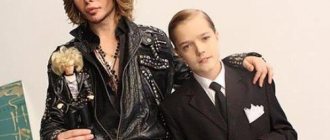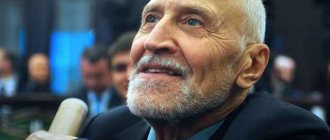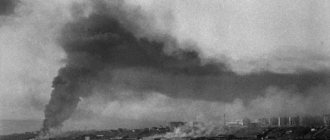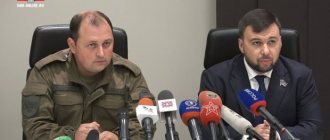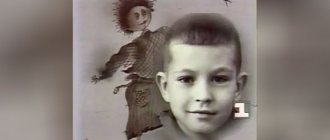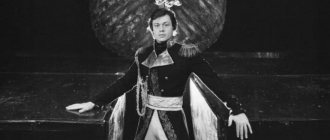Star of a bygone era: Nikolai Eremenko (junior)
Soviet cinema was rich in beautiful, thoroughbred artists. One of them is Nikolai Eremenko (junior). He would have turned 71 on February 14, 2020.
“In my youth, conquering my living space, my creative niche, fueled by the negative energy of the provincial complex, I made a lot of mistakes: I was angry, arrogant, arrogant. People began to be wary of me. Many simply avoided contact. This became a serious nuisance. At a time when it was necessary to make friends, I lost them. But those who knew me well treated me differently..." Nikolai Eremenko
Nikolai Eremenko was born on February 14, 1949 in the family of famous Belarusian actors - People's Artist of the USSR Nikolai Eremenko and People's Artist of Belarus Galina Orlova. Nikolai Eremenko said: “They raised me strictly. My father spent four years in concentration camps, this shook his nerves. I was lucky that my parents were often on tour. My nickname in the yard was “Artist”, because of my parents. This nickname offended me, because others had more hooligan ones...”
Nikolai spent almost his entire childhood behind the scenes of the theater.
The creative atmosphere of the theater, props, performances and rehearsals - all this caused him genuine delight. One day he got so carried away during a performance that he came on stage, festooned with weapons, and turned to his mother to help him button up his trousers. The performance of Moliere's play was disrupted, but Nikolai Eremenko's spectacular appearance on stage was remembered by the audience. Nikolai’s mother Galina Orlova recalled: “We did not force our profession on him.
But childhood impressions, of course, influenced my son’s choice - already at the age of three months he went on tour with us...” in the photo: Nikolai Eremenko (senior), Nikolai Eremenko (junior), Galina Orlova
After graduating from school, Nikolai came to Moscow to enter VGIK, but he failed to do so on the first try. He was late for the competition; by that time the course was almost full, and those who came to enroll were screened only so as not to offend. But the next year, director and teacher Sergei Gerasimov was recruiting for his VGIK workshop, in whose film “People and Beasts” Eremenko Sr. played his first big role in cinema, and this helped Eremenko Jr. enroll. From an interview with Nikolai Eremenko Jr.:
“However, I remember that you were transferred to the second, third, fourth years exclusively “conditionally.” Regularly, reprimands for the future “playboy” appeared on the dean’s board for absenteeism, bad behavior, and hooliganism. Eight “guardians” during the training! Nevertheless, you defended your roles as Sorel (“Red and Black”), Augustin Floridor in the vaudeville about Nitush and Alyosha (film “By the Lake”) with excellent marks. Kolya, it’s already a thing of the past, did you get into VGIK through connections?
- It’s useless to deny - it was in Gerasimov’s film “People and Beasts” that the father (Eremenko Nikolai Nikolaevich, who is the “senior”, People’s Artist of the USSR) played his first real film role. After school, I went to enter VGIK, but that year Babochkin was recruiting the workshop. Besides, I was late... There could be no talk about the Belarusian Theater! I intended to conquer Moscow. Without such ambitions, why become an artist? The next year my father took me to show me to Gerasimov.
“What will you read to us?” - Sergei Apollinarievich asks me. - “Zabolotsky”. He looked at me like that: “What exactly?” - “Thunderstorm.” He raised his eyebrows: “Do you like it yourself, boy? Well, read it, read it...” And I realized: I got it! My father forced me to memorize the poem: “Shuddering from torment, lightning ran over the world...” During the filming of “Men and Beasts,” Gerasimov muttered and recited these lines so many times.
With my boyish brain, I then hardly understood the full depth of the poem, but Gerasimov, apparently, was captivated by my choice. But Tamara Fedorovna Makarova didn’t want to take me to the workshop; that year there were too many of us “children”: Natasha Bondarchuk, Volodya Tikhonov... Later they told me that Gerasimov promised to make an artist “out of this boy.” He fulfilled his promise, it’s not for nothing that out of almost two hundred of his students he cast me in as many as six films: “By the Lake”, “Loving a Man”, “Red and Black”, “Peter’s Youth”, “At the Beginning of Glorious Deeds”, “Leo Tolstoy” " Only Tamara Fedorovna acted more with him.”
The photo shows a still from the film “By the Lake” (N.N. Eremenko’s debut film role), in addition to Belokhvostikova and Eremenko Jr. The film starred Vasily Shukshin, Natalya Bondarchuk, Natalya Arinbasarova, Vadim Spiridonov, Natalya Gvozdkova, Valentina Telichkina
Gerasimov began working on the film “Red and Black” in 1969, when Nikolai Eremenko was still studying at VGIK, and graduated seven years later. Eremenko began acting as an 18-year-old boy, which quite suited the image of Julien Sorel, who, according to the book, was “a short and frail young man.” But in just a couple of years, Eremenko matured, gained strength in his shoulders, and as a result, his hero emerged as a stately and handsome man who won the hearts of millions of spectators. The film was a huge success not only in the USSR, but also abroad. It was seen by audiences in Europe, with the exception of France, where in 1954 Gérard Philippe played the main role in the French film “Red and Black”.
Nikolai Eremenko said: “...my teacher meets me within the walls of the university, calls me over and says: “Kolya, have you read Stendhal?” He looks at me very carefully. I began to wriggle out: “What novel do you mean? He has several of them...” “You see, Kolya, in principle it’s not harmful for an artist to read books, at least sometimes. And “Red and Black” is worth reading more than once or twice, believe me. So, read it, and then I’ll explain why I gave you this torture.” A week later we meet, it turns out that Gerasimov decided to give me the role of Julien Sorel. I couldn’t imagine myself in her at all, I thought: “What kind of guy is this? No woman cries as much as he does.” To which Gerasimov, as always, very subtly, intelligently, and most importantly on time, addressing all the students through me, remarked: “You understand one simple thing: now you are happy not only because you are young, because you have everything ahead (broad avenues of life , as they used to say), but also because now in my workshop you can play whatever you want. All the world classics lie at your feet. Play whoever you want (Hamlet, Othello, Desdemona), hang each other, shoot, poison - you can do everything here except counter-revolution and pornography. Because when you leave the walls of the institute, you will not play what you want, but only what they give you: “As they say in Odessa, these are two big differences.”
stills from the film “Red and Black”
The role of Julien Sorel brought Eremenko not only real popularity and love from the audience (after the release of this film, the actor received the first bags of letters from enthusiastic fans), but also secured the actor’s role as a hero-lover. Eremenko himself later admitted more than once that “Red and Black” is his favorite film, and in an interview he said:
“We all fell in love with each other then. But it was more likely an innocent youthful flirtation, which passes faster than serious feelings. Although there was a moment when Natasha Belokhvostikova and I thought that we were doomed to each other. But it just seemed... When I played Julien Sorel in “The Red and the Black”, and Natasha Bondarchuk played Madame de Renal, it was much simpler, since the student crushes had long passed, and by that time Natalya had married Kolya Burlyaev. Only my namesake didn’t help his wife much, stopping by the set during intimate scenes - not every actress can withstand such control. Love, as you know, is a reverent feeling and you need to treat it very carefully even in movies. Otherwise, everything on the screen will look extremely unnatural. In addition, a woman, even if she is a super-professional actress, is not always ready to publicly expose her body, and with it all her feminine secrets. That’s why it often happens that the director films the breasts of one, the ass of another, and the head of a third... But I need to play the feeling, which means I need to liberate my partner as much as possible. And since on the set we should not be at the mercy of feelings, first of all I strive to become for her not a lover (personal relationships, by the way, extremely interfere with work), but a friend. And, by the way, many partners told me later that they didn’t even notice how they were naked in the right place for work...”
By the end of the 70s, Eremenko had a lot of films to his credit, including the drama “Tavern on Pyatnitskaya”, the musical “June 31” and “Rebel Barricade”. But when in 1979 the first Soviet action film “Pirates of the 20th Century” was released on cinema screens in the USSR, the effect was like an explosion. At the same time, the film’s director initially did not want to approve Nikolai Eremenko for the role, believing that after “Red and Black” viewers were accustomed to seeing him as a hero-lover, and not as an action hero. Then Eremenko took off his shirt, did a somersault, and the sight of his sculpted biceps convinced the director. Eremenko later said:
“My appearance is the instrument I play. This is the most expensive thing I have. This means I have to seriously take care of how I look. I would simply be ashamed to expose my shapeless body. A man should feel his muscles - his psychological state and internal balance depend on this. Of course, I have to make some efforts, in the morning I do strength exercises, swim in the pool, drink kefir at night, by the way, it’s a wonderful drink, it burns off extra pounds! But I hate the regime, so I can easily push all this if some pleasant pastime flashes on the horizon. In general, everything I have is from God, I was born this way, and this is how I live. Our generation is athletic. In my youth I practiced many sports, judo and karate, but not for long and not seriously. I somehow managed to combine everything: filming, sports, friends, girls, and sleepless nights... I’m an actor, I need to know everything about my heroes, and for this I need to experience everything on my own skin... the main thing is to stop in time "
stills from the film “Pirates of the 20th Century”
On the set of “Pirates of the 20th Century,” Eremenko worked without understudies. He said: “Now many young actors have good sports training, but at that time we were forbidden to perform risky stunts. I simply had no other choice, 2/3 of my role consisted of these very tricks, and if someone else would do it for me, then what would be the point of me taking on the role. The filming was actually very difficult: I had to dive for seven hours a day, I was beaten and dropped. One of the tricks almost ended in death for me. You probably remember the scene where my hero jumps from a cliff onto the side of a ship? I jumped, naturally not onto the ship, but into the water half a meter from the ship, trying to emerge and feeling that I was being pulled under the propeller blades. If I had been confused at that moment, then a pile of minced meat from the actor Nikolai Eremenko would have floated to the surface of the bay where the filming was taking place.”
The film caused delight among the public, irritation among critics and dissatisfaction among high-ranking Komsomol and party leaders.
Eremenko said: “Our state behaved rather cynically - on the one hand, it made a lot of money from the film, and on the other, it considered it its duty to smear it on the wall for “imitating the West.”
Although Brezhnev liked this picture so much that they took it for him when he went on vacation. True, he always forgot who was ours and who wasn’t, and asked: “Is this ours?” They told him: “Ours, ours, Leonid Ilyich” - “Well done...”. After the release of the film, the magazine “Soviet Screen” named Nikolai Eremenko the best actor of 1981, which greatly surprised the actor himself: “After the tremendous success of “Pirates,” I was puzzled... on the one hand I was happy, but on the other hand, I was somehow uncomfortable. If you play Stendhal, they don’t call you the best artist of the year; if you play a mechanic who only fights and swims, they call you. And for fans of “Red and Black” it was a shock. I received angry letters: “Aren’t you ashamed?! How could you fall so low from the heights of art? And on the other hand, children’s messages: sheer delight and requests to send karate instructions .
Between “red and black” and “pirates” Eremenko starred in a wonderful film, which, however, in Soviet times they preferred to forget - “June 31” (this role, by the way, is my favorite of Eremenko Jr.)
Director Leonid Kvinikhidze, a big fan of ballet, who directed the musical films “Sky Swallows” and “Straw Hat,” took on the task of filming “June 31.” He wanted to make a dance story in which not only film actors, but also ballet dancers would play. This idea brought the director many problems - after first Rudolf Nureyev, and then Mikhail Baryshnikov and Leonid Kvinikhidze’s wife Natalya Makarova refused to return to the USSR from a Western tour, ballet dancers were considered unreliable people... The director had to defend his idea and each of the candidates literally with a fight .
Nikolai Eremenko Jr. They tried to persuade him to agree to the role of the artist Sam, but he was afraid that he would be forced to sing and flatly refused. He didn’t want to dance either, but the thought of singing just made him panic. They promised him that Sam would not sing, at most he would dance a little. The actor agreed to these conditions.
«“I thought with horror that they would force me to sing there. It seemed to me that it would not be very aesthetically pleasing. I was “steadfast” until the end and was the only one left who did not sing. All they could get me to do was walk with my partner across the Star Bridge - a dance variation
" (N. Eremenko Jr.)
Despite the disapproval of the film studio management, Bolshoi Theater soloists Alexander Godunov and Lyudmila Vlasova, as well as ballet dancer from the Stanislavsky Musical Theater troupe Natalia Trubnikova, were approved for the roles. Her vocal parts were to be performed by a professional singer. The choice fell on the soloist of VIA “Music” Tatyana Antsiferova, who was found in Transcarpathian Uzhgorod. Difficulties also arose with the music, the author of which was the popular Soviet composer Alexander Zatsepin. He had to make more than 30 amendments to the arrangements, as the management of the film studio expressed complaints: “ They told me that my music is the backside of capitalism, that all the performers need to be replaced, and that the film itself should be banned
"
The dancers' too revealing outfits also caused dissatisfaction. The film was finally released, but almost immediately fell into disgrace. The management's concerns about the ballet dancers were not in vain - in August 1979, Alexander Godunov, during a Bolshoi Theater tour in the USA, decided not to return to the USSR and asked for political asylum. Therefore, after the premiere in December 1978, the film with his participation was sent “to the shelf” for a long 7 years. The film was not shown for the reason that in the early 1980s. Composer Alexander Zatsepin also left the USSR for France, after which even songs from the musical were banned. The most absurd thing was the ban on performing the song “A World Without a Beloved” on stage - this phrase seemed to someone to be an allusion to the emigration of the director of the Taganka Theater Yuri Lyubimov, who, after touring abroad in 1982, did not return to the USSR. The artistic council reached a verdict: “ How can we miss this song?
After all, they will think that we regret that Lyubimov remained in the West! “And in the lines of the song “Star Bridge” they saw propaganda of the American space weapons program, conventionally called “Star Wars” by journalists.
Princess Melicent is indignant)
This is such a movie... But let’s return to the story of Nikolai Nikolaevich.
In the first half of the 90s, many actors painfully went through a difficult period of lack of demand after the collapse of Soviet cinema. And Nikolai Eremenko Jr. decided to start directing himself. For his father’s anniversary, he made the film “Son for Father” in 1996, in which he played together with his father - before that they had not acted together. Nikolai Eremenko Jr. said in an interview: “But you can’t escape fate. Film playwright Valentin Chernykh brought a script with roles for me and for the “elder”... My father was about to turn seventy, although I always had the feeling that compared to me he was a boy, at that moment my father seemed somehow... extinct. I wanted to shake him. And I took a chance on my directorial debut. Today I regard the very fact of my directing as a fright: I’m not used to sitting idle, and it was precisely during these years that my “midlife crisis” occurred and the beginning of the decline of cinema. And since I believe that the only thing in which humanity has achieved perfection is the art of self-justification, I have come up with a ton of self-justifications for myself. But most importantly, I needed to pull my father out of the feeling of old age. Everything that is not realized in life is realized in this film. And the people left after him in a good mood, just like in Soviet times. This is nostalgia for old cinema, old times and at the same time saying goodbye to it.”
still from the film "Son for Father"
In 2001, Eremenko Jr. starred in tandem with N. Andreichenko in the film “Give Me Moonlight”
Natalya Andreichenko recalled working with Eremenko: “For me, Moonlight is, first of all, the discovery of Nikolai’s personality. I knew Eremenko all my life, but as a star, a legend, a superhero. And I never thought that Kolya was SUCH a person! Either the arrogant image that he carried from the screen in the film “Red and Black” was to blame for this, or the talk about him in the press. But when we met, I was pleasantly surprised. When we were filming, we went for sports runs together every day. He was very athletic"
Still from the film "Give Me Moonlight"
His last film work was the role of Yuri Rostislavovich, the father of Cosmos in the TV series “Brigada” (the film was released after the actor’s death).
As for his personal life, here, on the one hand, Eremenko Jr. appears before us as an exemplary family man who lived with his first (and only) wife for 27 years, and on the other... On the other, a divorce after 27 years of marriage, three women, confident that each of them is “his only love,” illegitimate daughter. You can write a separate post about this. Nikolai loved both daughters, and was literally torn between families. Actor Vladimir Nosik said: “Nikolai was even glad when his daughter refused to continue the dynasty. In general, Kolya was a wonderful father, and with Vera (approx. Vera Titova is the actor’s wife) they complemented each other very well. And yet their marriage fell apart. Kolya was very upset about the breakup, although he did not talk about the fact that he had not lived in the family for a long time.” After his divorce from Titova, Nikolai bought an apartment in Moscow and began to live with Lyudmila. The actor said in an interview about his family life: “Everyone should have a family, this is the haven where you can take a break from your exploits, drift quietly and sleepily. I love my home, but by nature I am rather a loner, any group oppresses me, I was born to live alone. Men like me are not made for family life."
.
Vera Titova and Nikolai Eremenko
Eremenko Jr. with the “official” daughter Olga
Tatyana Maslennikova is the secret love of Eremenko Jr.
(Tatyana Yuryevna is still sure today: he loved only her, and continued to live with his wife because he did not want to upset his parents. Nikolai Eremenko Sr. always said that men from their family do not leave their wives. Even the birth of his daughter Tanya could not force Nikolai to leave families.)
Eremenko Jr. with illegitimate daughter Tanya
The artist’s last love, Lyudmila (Surprisingly, this girl also claims: Nikolai Eremenko loved only her, wanted to give her his last name and dreamed of having a son.)
The actor’s mother, Galina Aleksandrovna, says that on one of his visits to Minsk after the divorce, his son, leaving, said: “I shouldn’t have started all this...” He seemed to regret the divorce, the broken life. On July 1, 2000, Nikolai’s father, Nikolai Eremenko Sr., died. And a year later, barely turning 50, he himself died. A detached blood clot stopped the creative path of the actor, whom the audience loved so much. Galina Orlova said: “My son was with Lyusya when he suddenly lost consciousness. She immediately called an ambulance and called me in Minsk. I took the train and arrived at the Botkin hospital in the morning. Kolya lay unconscious. “I went into the intensive care unit, saw Kolya naked, covered with a sheet, his hands were tied, he was breathing through a machine. I asked the doctors: Can he hear me? They said no. Then she asked: Will he ever come to his senses? The doctor said: No! He had about three hours to live. I slid down the wall and lost consciousness. They pumped me out, and all this time I sat next to my son, talking to him about everything.”
He died on May 27, 2001. In addition to his mother, all three of his women accompanied him on his last journey, and each was confident in his love.
The death of Nikolai Eremenko, full of strength and plans, shocked everyone. But the actor, who had the image of Superman and a hero-lover, was in fact an easily vulnerable and sensitive person. Nikolai’s classmate Nina Maslova said: “The mask of a hero grew on him, he couldn’t relax even for a minute, even in a friendly company, overcome his pride and admit that he was weak, worried, and couldn’t handle everything in this life. I think his psyche could not withstand this stress."
.
When Eremenko Sr. died, Nikolai asked: “Bury me next to my father.” His will was done. Father and son are buried in Minsk at the Eastern Cemetery.
Thanks to namedni-60e-90e.livejournal.cocom, kulturologia.ru and the Internet for the text. Thanks to kinopoisk.ru, kulturologia.ru and the Internet for the photo.
Beloved woman of father and son Eremenko
Galina Orlova was always called the queen in the theater - proud posture, head held high, confident look. “I was behind Eremenko like behind a stone wall.” The wall disappeared in the summer of 2000, and two years later Galina Aleksandrovna again appeared on stage in a play that was staged between the two of them. With a new partner, but with memory in your heart.
In her living room there is a large TV, with a lot of cassette tapes nearby. “These are all programs about my Erems, their interviews. I only watch them..."
I never finished school
We met in the studio at the Vitebsk Drama Theater. I took the entrance exams when I was still in 9th grade. I was afraid that they wouldn’t accept me without a ten-year certificate. They accepted, but the studio director said: “Now go finish school.” But how could I sit down at a desk again when there is such interesting learning in the studio - plastic arts, acrobatics, voice training, dance, etudes! Will I be forced to do math? Never! By the way, our hatred of mathematics runs in the family; Kolya couldn’t stand it either.
And it was impossible not to fall in love with Eremenko. He was so handsome! God gave me the love of such a man. He was handsome until the last day - his head was already white, but his brilliance, his beauty! I understood the women who fell in love with him. Once my men went with their film “Son for Father” to some festival. We returned, and my son said to me: “You know, mom, our Erema was more popular with the women than I was.” And I had no doubt about it.
I always knew that I would have an artist son
We got married immediately after graduating from the studio. And in this photo I'm 19 years old and eight months pregnant. I always knew that I would have a handsome son, that he would become an artist. Even when I wasn’t married yet.
We never raped Kolya - go wherever you want. His entire youth was devoted to sports - basketball, football, he loved the Beatles and television. I told him: “Kolya, read.” They made a library for him in his office. “Oh, mom, I’ll still have time.” And when he came for an interview at VGIK, it turned out that he knew nothing. He admitted this to me many years later. And recently I found his letter from the filming of “By the Lake”. It was 1969, my second year: “When there is no work, you have to hang around on the set. In the evenings we get together to dance, Telichkina and I gave out a shake at the dance and earned applause. Read books!! (Yes mom!)". Like, imagine, I’m reading.
And I specially saved his school diaries and took them to the dacha. He somehow arrived and found: “Mom! You didn’t show it to Olga (daughter)?” All covered with comments, opposite each one is my painting. Finally, “We ask Nikolai Nikolaevich...” - this is when the mother is powerless. But since we ourselves were far from ideal at one time, our son was not tormented.
Once I came from the filming of “Wishes Come True.” Comes to me: “Mom, hold this hand. I beat Smoktunovsky with her.”
I collected all his photographs in a separate album, I wanted to give it to him: “Not yet, Mom.” And then there was no one to give it to...
Fifty years together
If you remember everything, it will take a long time. We always had fun together. They moved to Minsk at the invitation of the Kupala Theater when Kolya only finished 4th grade. I left the Kolasovsky Theater a month before I was awarded the title of Honored Artist. She was a fool, of course she should have waited first. But, firstly, it seemed to me that it was indecent to wait. And secondly, I thought that if I was worthy, then does it matter in which theater I receive this title. It turns out there was a lot I didn't know. As a result, she received the title only nine years later, when Masherov came to one of the performances. He took the program and said: “What, isn’t Orlova already deserved? I remember, she was introduced a long time ago?” That's when everyone started running.
Here are my beauties. When they ask who my son is more like, I say both. As Erema said, they shook it well. When Kolya played military roles, his father looked like him. And where with long hair, there I am.
There were many signs
What am I living for now? Don't know. It doesn't go away, it stays forever. Work saves. I am an actress, I have to work, and the fact that the theater-studio of the film actor restored “Dear Liar” helped me a lot at the most critical moment. Eremenko loved me very much, every woman can dream of such love. For such a lovely, kind boy to be born...
Before Kolya’s death, I had a lot of signs. They say it's a joke, but I'm not crazy. When Nikolai Nikolaevich died, we had already purchased vouchers to the sanatorium and tickets to Jurmala and back. I didn't know what to do. Kolya said: Mom, go. I ordered a church service there for forty days. But there was a feeling that everything I did was not accepted. Like peas against a wall. When they brought me to the icon of St. Nicholas the Pleasant, it seemed that his gaze was somehow heavy. It didn't make me feel any better. And the suite has two huge rooms - and I’m alone. Nightmare, I would like a small room. I’m sitting and suddenly I feel Nikolai Nikolaevich’s breath near my face. And his voice: “You should know...” I got scared, waved my hands, and ran. And when I calmed down, I realized that he had warned me. Warned about Kolya. Now I am convinced of this. Then how many times did I sit in the same place, at the same time: “Erema, tell me what I should know? At least one word!”
And this bird. Before Kolya died, a dark bird knocked on the window. The same thing happened before my mother died. My heart sank, I thought, who is this? I? It couldn't have occurred to me that Kolya. I then wondered why she knocked on the window of the room where I was. After all, this could have happened without me, and I would not have known. But this news came to me so that I could see...
And before the death of Nikolai Nikolaevich there were no signs. He only knew it himself. Not long before this, he was lying in the medical commission, a nurse came into the room, and he looked out the window and didn’t even turn around. “Kolya, where are you looking?” - “To the morgue...”
Granddaughters will come to the opening of the monument
The old man’s beauty did not spoil him, but his son is a different generation. Kolya has tied so many knots in his life...
The eldest granddaughter Olya is already 27 years old. She graduated from a linguistic university, knows three languages, her husband is a programmer, a very smart guy. And the youngest Tanya is now twelve. A wonderful girl, she looks like Kolya. I first learned about its existence at the funeral. Colin’s wife was shocked to see another family at the funeral...
On May 1, he left me with his third passion, and on the 27th he passed away. Before leaving he said: “There was no need to change anything...”
I understood a lot when I read “Agni Yoga” by Roerich. A lot has been revealed to me: I live according to some kind of scenario that was written for me long before I was born. Now I'm wondering how it will end...
MEMORIES
Govorukhin was trampled in Moscow for the “Voroshilov shooter”
On the way back they remembered those who had recently departed.
Especially film director Stanislav Govorukhin
, with whom the Eremenko family was friends.
— The younger Kolya starred with Stanislav Sergeevich in his film “In Search of Captain Grant.” How many countries did they travel filming? And everywhere in hotels we lived in the same room with Volodya Gostyukhin
. Gostyukhin later said that he had never laughed so much. I understand why: Kolya had a very sharp mind and a wonderful sense of humor.
— Did you have close contact with Govorukhin?
— We met every time he came to Minsk for the Listapad film festival. I remember after the premiere of his film “The Voroshilov Shooter,” which I really liked, I said a lot of good words to him. The film then hit the nerve of time! He was very surprised by our warm reaction, and then said: “And you know, I was simply trampled in Moscow for this picture...”.
But Slava could not be broken or turned in one direction or another. His father is a Don Cossack. The power, strength, and stature of this breed were felt in him too. He never adjusted to other people's opinions. I didn't want to please. He said what he thought, regardless of the consequences, which is generally very rare in the bohemian cinematic environment. This environment has crushed and crushed many. How many such examples have we seen! But not Slava. He remained himself. He wasn’t talkative, but when he spoke, it was always to the point. I really loved his humor and jokes, of which he knew a great many.
— As a person of the Soviet era, you probably don’t believe in horoscopes, and yet your union with Eremenko “Gemini - Sagittarius” is quite successful from an astrological point of view. He has the element of air, you have the element of fire.
- Maybe that’s why we lived together for so many years? (Laughs). I really don’t believe in horoscopes, but Kolya Jr. was one hundred percent Aquarius. When he was enrolled in swimming, he had to attend classes two or three times a week, so he stopped going to school on those days. He said: “I have a swimming pool today!” They barely managed to persuade me to somehow combine sports and studies.
- Is he like his father? He also loved water.
— Eremenko Sr. was a passionate fisherman. He loved to sit somewhere by a river or lake with a fishing rod. Communication with Belarusian nature was a real spiritual need for him. The Kupala Theater even formed its own special fishing company, which also included the artist Foma Voronetsky
and artistic director of the theater
Valery Raevsky
.
Nikolai Eremenko's mother: She slid down the wall and fell when she learned that her son had three hours to live
The mother of actor Nikolai Eremenko, who would have turned 69 on February 14, told who she blames for his death.
On Valentine's Day, the future People's Artist of Russia, whom many called a sex symbol, Nikolai Eremenko, was born. His heart stopped 17 years ago, he died of a stroke, having previously forbidden his wife: “When I’m drunk, no ambulances.” On the eve of the memorable date, we visited Minsk and had a heart-to-heart talk with Nikolai’s mother, People’s Artist of Belarus Galina Orlova. She spoke for the first time about her loneliness and the fact that she had not communicated with her granddaughters for many years...
– When Kolya was a teenager, we never thought that he would become an artist. He was fond of adventure literature, loved to walk with the boys in the yard, - 89-year-old Galina Aleksandrovna indulges in memories, sorting through the family photo archive. – And after finishing school he said that he wanted to be an actor. My husband and I decided to send him to VGIK, at that time Sergei Gerasimov himself was taking the course. Nikolai Nikolaevich (Orlova’s husband, People’s Artist of the USSR Nikolai Eremenko is known to many for his roles in the films “Eternal Call”, “People and Beasts.” - Author) called and asked to see Kolya. His arrival is pure cronyism. But it wasn’t his dad who played for him! The husband immediately told Sergei Apollinarievich: “If you don’t like Kolya, feel free to expel him!” To which the director replied: “I’ll make him an actor.” My son’s talents did not appear immediately; he was quite repressed; it was then, under the influence of a talented teacher, that he began to open up.
Gerasimov invited his son to his film “By the Lake” along with his other classmates. This work became the first film role, and, of course, the film was a great success. After graduating from VGIK, he spent many years preparing to star in Gerasimov’s “Red and Black,” an adaptation of Stendhal’s novel. And Kolya was then very worried that everyone was only discussing his role in “Pirates of the 20th Century”; it was after this picture that he was recognized as the best actor of 1981 according to a survey by the magazine “Soviet Screen”. Well, that’s understandable, because “Pirates” is a Western, an adventure, and you have to think about Gerasimov’s film.
– How was he able to switch from Stendhal to filming “Brigade” in the 90s?
“This time is a terrible phenomenon, cinema fell into a hole, and it was unclear whether it would ever get out or not. Now they have finally started doing something worthy like “Legend No. 17”, but in the 90s they were filming only bandits. At that time, many talented artists drank themselves to death and died. And Kolya got drunk! This is what destroyed him, turning into a disease.
– Have you tried to treat your son?
– Did I or Nikolai Nikolaevich know about this?! We are in Minsk, and he is in Moscow. And Kolya’s wife Vera didn’t tell us anything either, but everyone was silent. Director Dmitry Astrakhan, who directed his son in the latest film “Give Me Moonlight,” wrote about this in his book about Kolya “Black and White.” He invited Kolya to audition, he did everything accurately and professionally, but by the way he laughed and spoke a little louder, the director guessed that he was drunk. The next day Kolya did not show up for filming at all, and then Astrakhan realized that it was an illness, and not a lack of discipline. Then he offered him, without audition, to play the main role in his film “Give Me Moonlight.”
Alcohol changed him a lot. Look what he was like (looks through the photo in the book), but here is one of the last pictures, I don’t even know who took it (standing in slippers, loose pants, a checkered shirt and holding two bottles of beer in his hands. - Author).
– Maybe he was unhappy because of the ups and downs in his personal life?
- Of course, he made a lot of knots. After graduating from VGIK, he married Vera; she is a historian by training, but she has been working in Moscow for many years at the House of Cinema. Their daughter Olga was born in 1975. And at first everything was fine. They all came to visit us in Minsk together. In one of his interviews, Kolya said: “I rest my soul with my parents, I don’t feel so comfortable anywhere, I drink comfort and peace with every cell, this is happiness!” I later confessed to him: “Thank you for such words, son, I need more.”
Neither I, nor Nikolai Nikolaevich, as far as I know, nor Vera - no one knew that Kolya had a second family, that he had a daughter, Tatyana, named, apparently, in honor of his mother, Tatyana Maslennikova. I don’t know why Kolya didn’t show them to us, apparently he was afraid that dad and I wouldn’t understand this and would judge us. He only let it slip once, when I told him that we need a grandson, we already have a granddaughter, and he replied: “Well, they’re just girls.” Even then I thought, like, what kind of girls are they, he has one daughter, but I didn’t ask again.
– In one of the interviews, Nikolai said: “We, Eremenkas, do not betray our wives,” and a year after that he divorced...
– Yes, she and Vera lived for 27 years and broke up! But life is life, everything flows and changes, especially in the world of cinema. The son himself said: “I am not created for family life, a lone wolf.” He came to this conclusion as an adult. After the divorce, he brought to our house a young girl, Lyudmila (18 years younger than the actor - author), who worked with him as an assistant director on the film “Son for Father,” and said: “This is my future wife.” I answered: “Well, if the wife is future, then, of course, let her pass.” After all, he is an adult and far from a fool - how can I influence him? At this age, you can’t order anything; everyone controls their own destiny.
- But before his eyes there was an example of your happy life with Nikolai Nikolaevich. Why do you think he didn't follow suit?
– This is not a standard that must be followed. We have lived more than 50 years together. But this is a completely different story, Nikolai Nikolaevich was also very handsome and popular, many ladies had their eyes on him. But he had a different training, he still volunteered for the front at the age of 15, adding three years to himself. He was a concentration camp prisoner and was tortured by the Gestapo.
– Composer Irina Gribulina admitted in a television interview that she lived with your son for two years while he was married to Vera. This is true?
– I heard about this dirty story. This lady is a dirty yard cat, she only causes disgust, some kind of anomaly... How can I know whether he lived with her or not, with whom he slept?!
– Today it is Tatyana Maslennikova who calls herself the main woman in Nikolai’s life, what do you think about this?
– He didn’t have the main ones, everything was intermediate.
– Do you communicate with their daughter Tatyana, your granddaughter?
– I first saw her 17 years ago at Kolya’s funeral, she was 11 years old then. I know that she lives in Moscow, but we don’t communicate, although we didn’t quarrel, it just so happened.
– Would you like to hug your granddaughter?
“This is someone else’s family, I never knew her, my son didn’t introduce her to her, although he gave her his last name. I don’t know what she became, what came out of her...
– Are you closer to your granddaughter Olga?
– Previously, both she and Vera came to see me in Minsk. But in recent years we have completely stopped communicating; they don’t call. I don’t even know what happened, apparently they were offended by something, I hope that everything will become clearer. I communicate only with my son’s third, common-law wife, Lyuda, she lives in Minsk, works at a film studio, calls often and comes to visit, and does not forget me.
After all, I already have a great-granddaughter; Olya gave birth to a daughter, Anya, she is already 6 years old. True, I have never seen her, but they sent me a photograph of her, a beautiful girl. I read Olya’s interview, I have it on my nightstand, where she says that Anechka is already turning into a real actress. She dresses up as either a princess or an old lady, and when she gets capricious, she runs to the mirror and says: “I want to see how I look in tears.”
– Do you miss them?
– Well, how can I say... Time levels out some things. Maybe it would be unbearable if I didn’t work, but I’m performing at my native Yanka Kupala Theater.
– How did you find out that your son had a stroke?
– This happened in May 2001, almost a year after Nikolai Nikolaevich’s death from a heart attack. As far as I know, Luda wanted to call an ambulance, but he strictly forbade her: “When I’m drunk, no ambulances.” They waited until the evening for a narcologist, and at night their son became worse and was urgently hospitalized at the Botkin hospital with a stroke. Lyudmila called me and literally shouted into the phone: “He’s still alive, come!” I didn’t understand anything: “How are you alive? And what happened to him? A young, healthy man!” Luda was sobbing and hung up. I don’t even remember how I got to Moscow. I came straight to the Botkin hospital, they kept me on the stairs for three hours, the doctors there did something to him. When I finally went into the intensive care unit, I saw Kolya naked, covered with a sheet, his hands were tied, he was breathing through a machine. I asked the doctors: “Can he hear me?” They said no. Then she asked: “Will he even come to his senses?” The doctor said: “No! He has about three hours to live." I slid down the wall and lost consciousness. They pumped me out, and all this time I sat next to my son, talked to him about everything...
To the point:
Lyudmila, the third wife of the People's Artist of Russia, with whom he never had time to celebrate the wedding:
– This is my life, and I don’t owe anything to society, I’m not its legal wife. – At first, Lyudmila reacted very sternly to our questions. - Those who love him will not forget him. Yes, his mother Galina Aleksandrovna and I communicate well, but she is a complex person and doesn’t really allow herself to be approached when choosing her social circle. I don’t know what happened to her granddaughters.
– Many of Nikolai’s friends blame you for his death, saying that you did not know how to behave correctly, and if he had not left his first wife Vera, who studied his body well, he would have been alive...
“People need to find someone to blame.” Yes, I blame myself most of all, it seems that I didn’t do something, I didn’t insist on calling an ambulance, and not waiting until the evening for the narcologist to arrive. But over the years you realize that everything is in God’s hands. And are those people who talk about Kolya on talk shows friends?! I’ll tell you honestly, Eremenko was a deeply lonely man.
Source
Biography
Born on February 14, 1949 in Vitebsk, in the family of People's Artist of the USSR Nikolai Nikolaevich Eremenko and People's Artist of the Belarusian SSR Galina Aleksandrovna Orlova. N.N. Eremenko Sr. in 1948-1959 was an actor at the Theater. Y. Kolas in Vitebsk, and since 1959 he worked at the Belarusian Academic Theater named after Y. Kupala in Minsk (G.A. Orlova also worked there). Since 1960, my father acted in films. Wife - Titova Vera Yurievna. Daughter - Mishenkina Olga Nikolaevna (born 1975).
Nikolay Eremenko photography
Nikolai Eremenko Jr.’s entire childhood literally passed behind the scenes.
The atmosphere of the theater, the props, the performances - all this caused him genuine delight. One day he got so carried away during a performance that he went on stage, covered in weapons, and turned to his mother to help him button up his trousers. The performance of Moliere's play was disrupted, but the first (and so spectacular!) appearance of Nikolai Eremenko on stage was remembered by the residents of Vitebsk for a long time. Advertising:
At the age of 12, Nikolai and his mother starred in a film about traffic rules, commissioned by the traffic police. In this short film, young Nikolai disrupted the order on the street, showing how pedestrians should not behave. Actually, he had to do something similar in the yard companies, in order to constantly prove to his friends that he was “their guy” and not a good boy from a privileged family.
The decision to become an actor was made by Nikolai without much hesitation, although he was afraid that his last name might interfere with him. However, despite his fears, his surname (or rather, his father) helped him enter VGIK, the studio of People's Artists of the USSR Sergei Apollinarievich Gerasimov and Tamara Fedorovna Makarova. The fact is that Nikolai’s father, who played his first significant role in Gerasimov’s film “People and Beasts” (1962), knew Sergei Apollinarievich well and advised his son to read “The Thunderstorm” by Nikolai Zabolotsky, the director’s favorite poem, during the entrance exams. Thanks to this little trick, Nikolai was accepted into VGIK, despite some opposition from T.F. Makarova, who did not want to take on another “cinematic” offspring.
Having entered VGIK, Nikolai began to intensively “work off” the “advance” received from the master. He took part in many sketches and productions, playing the most unexpected and polar roles: Gogol's Plyushkin, Lermontov's Zvezdich, Floridor from Mademoiselle Nitouche, Peter from The Power of Darkness. Despite his high performance, the aspiring actor was transferred to the 2nd, 3rd and 4th courses on probation due to constant absenteeism, “tails” and even... hooliganism. Subsequently, Nikolai Nikolaevich more than once recalled with a smile both his admission to VGIK and these “conditional” transfers, since he always considered the main thing not external circumstances, but his passionate desire to be worthy of his father in the service of the acting profession.
In 1970, Nikolai Nikolaevich graduated from VGIK, having defended himself with “excellent” marks for the roles of Julien Sorel, Augustine-Floridor in graduation performances and the role of Alyosha in the film by S.A. Gerasimov “By the Lake” (1969), which became his “adult” cinematic debut. The role of Julien Sorel in the graduation play “Red and Black” was not accidental: Gerasimov “brought” the actor to it for several years, from the 2nd year, when Eremenko played a young priest in N. Gubenko’s academic work “Solemn Liturgy”. Both Nikolai Eremenko and his fellow students tried in the play “Red and Black” to show everything they had learned from Gerasimov, they worked with complete dedication - the performance was not interrupted even when the leading actor had a nosebleed from tension.
Like other Gerasimov students, Nikolai Eremenko entered cinema while still studying, because the uniqueness of the “Gerasimov school” was that Sergei Apollinarievich combined training and production. Thanks to this, Gerasimov’s students were fully prepared for the difficulties of independent existence, they were determined to dialogue with any directors and responsibly fulfill their acting tasks in the film crew. They were also instilled with an understanding of the “ideological nature of acting” as the need for a thorough knowledge of the text of the role and the social biography of the character being performed.
Showing attention to each of his students, Gerasimov especially carefully looked after Nikolai Eremenko, since he saw in him the makings of such a performer of romantic roles, which the cinema of that time lacked. Gerasimov gave Nikolai not only professional, but also everyday lessons, which the aspiring actor remembered for the rest of his life. One of the teacher’s pieces of advice Eremenko later often recalled: “Here, Mikola, you walk through life with your head held high and suddenly you encounter a barrier on the way. But you carry your head high and may not notice him. Still, manage to bend down, then straighten up and move on with your head held high.”
Best of the day
| John Argyropoulos Visits:274 | Polina Vitorgan Visited:271 | The last Russian emperor Visited: 265 |
After graduating from VGIK, Nikolai Nikolaevich in 1971 became an actor at the Theater-Studio of Film Actors, and since 1976 - an actor at the M. Gorky Studio.
Eremenko again played his second role in the film of a teacher - in the melodrama “Loving a Man” (1972). In this film, as well as in the films “Hot Snow” (1972, director G.G. Egiazarov), “Fulfillment of Desires” (1973, director S.S. Druzhinina), “No Return” (1973, director A.A. Saltykov), “Rain” (1974, director B.V. Yashin), “The Ivanov Family” (1975, director A.A. Saltykov) Nikolai Nikolaevich seemed to retreat from the role of romantic heroes “prepared” for him. But if you take a closer look, in Eremenko’s first acting experiences, one discovers a desire to show characters who want to quickly prove their human worth to the world around them and commit rash and irreparable actions along the way. Lieutenant Drozdovsky in the film “Hot Snow” (Eremenko really wanted to play this role in the film adaptation of Y. Bondarev’s novel) is essentially just a boy, impetuous, vain and selfish. His cruelty and inattention to people lead to the death of nurse Tanya because of him. Eremenko finds an internal justification for his hero’s actions: Drozdovsky dreams of a real feat, and it is boyish impatience that prevents him from realizing his responsibility to his comrades. The actor shows the romanticism of the young lieutenant “in spite of himself”, trying to establish himself as a versatile performer.
Eremenko demonstrated the same approach to revealing the character of the hero in the role of philology student Nikolai Trubachevsky (the film “Fulfillment of Desires”). The human inferiority of the young scientist is especially clearly manifested against the background of his scientific achievement - the deciphering of Chapter X of Eugene Onegin. Trubachevsky's ambition almost leads him to complete collapse in life, but Eremenko does not strive to be edifying in this role. He is trying to understand and feel how far vanity and unjustified ambitions can take a person.
Whether Eremenko wanted it or not, in these roles he internally “ripened” in order to play Julien Sorel in the four-part television film “Red and Black”, produced in 1976 by S.A. Gerasimov. In the same way, Nikolai Nikolaevich’s fellow students, actresses Natalya Belokhvostikova and Natalya Bondarchuk, turned out to be ready to give in this film not a student’s, but a professional interpretation of the heroes of Stendhal’s novel. And all this, along with Gerasimov’s direction and the acting of recognized masters - Leonid Markov, Vaclav Dvorzhetsky, Mikhail Gluzsky, Leonid Obolensky, Gleb Strizhenov - found recognition among both the audience and critics.
Playing the role of Julien Sorel became for Eremenko not only a noticeable professional success, but also the student’s gratitude to his mentor. In understanding and implementing directorial tasks, Nikolai Nikolaevich proved himself to be an ideal performer of the “Gerasimov school”, having most fully mastered its methodology. Depicting the passion, romanticism, and cruel internal struggle of his hero, Eremenko constantly “keeps in mind” the social background of his behavior, without deviating one iota from realism. Eremenko’s highest achievement in this film is Julien Sorel’s monologue, delivered before his death in prison, which the actor carries out in one breath.
After “Red and Black,” Nikolai Nikolaevich received the love of the audience, which accompanied him throughout his life. No matter who he played, the audience, captivated by his charm, perceived his characters as examples to follow, as an opportunity for the manifestation of strong feelings and aspirations for something beautiful in the most unimaginable circumstances. Eremenko’s heroes were precisely heroes—people of action, not reflection—and therefore they brought a fresh spirit even to the historical-revolutionary and war films that had become the same type, regardless of which side they were on. This quality of Nikolai Nikolaevich’s acting talent was clearly manifested in such films as “Walking through the Torment” (1977, director V.S. Ordynsky), “Escape from Prison” (1977, director R.B. Vasilevsky), “Tavern on Pyatnitskaya” (1977, directed by A.M. Faintzimmer), “Rebel Barricade” (1978, directed by Yu.A. Shvyrev), “It was the fourth year of the war” (1983, directed by G.M. Nikolaenko), “Authorized by the Revolution” (1987) , “Trotsky” (1993, director L.G. Maryagin).
In each new work, the actor tried not to give directors a reason to exploit his external characteristics and avoided replicating previously discovered techniques. Meanwhile, the huge success of “Pirates of the 20th Century” (1980, director B.V. Durov) showed that viewers are also fascinated by the way Eremenko’s hero swims, dives, and fights. The actor performed all the stunts in this action film on his own, easily proving that he can work at the level of a Hollywood “star.” His Senior Mechanic - a knight without fear or reproach, who makes risky decisions and invariably wins in any situation - turned out to be the complete opposite of those characters that the actor played in the early 1970s, since, in addition to romantic views, he also had a sense of responsibility for loved ones.
The success of “Pirates of the 20th Century” upset the actor, as it left his serious work in the shadows, and at the same time pushed him to further search for his “I”, to more fully reveal his abilities. The freedom of self-disclosure was given to Nikolai Nikolaevich by historical films, in which he felt as confident as Jean Marais or Gerard Philip in French cinema. “The Youth of Peter” and “At the Beginning of Glorious Deeds” (1980, director S.A. Gerasimov), “Squadron of Flying Hussars” (1980, director S.I. Rostotsky), “Leo Tolstoy” (1984, director S.A. Gerasimov), “The Royal Hunt” (1990, director V.V. Melnikov), “Crusader” (1995, director A. Inshakov), “Unfamiliar Weapon, or Crusader-2” (1997, director I.V. Dykhovichny), “A Romance of Knights” (2000, director A. Inshakov) - all these films became a fertile field both for the application of acting skills and for the brilliant implementation of external data.
Eremenko did not forget to expand his performing range, starring in such films as “The Thirty-First of June” (1978, directed by L.A. Kvikhinidze), “In Search of Captain Grant” (1985, directed by S.S. Govorukhin), “Gladiator by Hire" (1993, director D. Zaitsev), "Maroseyka, 12" (2000, series "Wet Business"). And in 1995, as a director, he directed the film “Son for Father,” in which Eremenko Sr. played his penultimate role.
In L.A. Kvikhinidze’s film “White Nights” (1991), Eremenko proposed a similar interpretation of the classic hero, who combines incomparable qualities: romanticism and prudence, openness to the world and knowledge of the other side of life. This is exactly what unites the actor’s on-screen characters, no matter how different they may be, and distinguishes him from them. No wonder in one of his last interviews he said: “I am neither a pragmatist nor a romantic, I am a realist. Romantically, I wouldn't have survived 30 years in the movies. This is a rather tough world where, as one great artist said, romantics with a pretty face end up badly.”
Nikolai Nikolaevich Eremenko died on May 27, 2001 in Moscow. He was an accomplished actor and person. He was buried next to his father in Minsk.
According to the results of an annual survey of viewers by the magazine “Soviet Screen”, he was recognized as the best actor of 1981 for his participation in the film “Pirates of the 20th Century”. In 1980 he became a laureate of the Lenin Komsomol Prize, and in 1994 he was awarded the title of People's Artist of Russia.
Best weeks
| Rich and famous Visits: 996 | A man's beard decorates him Visited: 1064 | Margaret Douglas Visits:1005 |
Documentaries
Nikolai Eremenko in the 80s was the main handsome man of the country and the hero of the highest-grossing action movie “Pirates of the 20th Century”. He was strong, irresistible and popular. And only relatives and friends knew what was hidden behind this image, calling the actor a superhero with delicate skin.
In the life of Nikolai Eremenko Jr., the key figure was his father, the famous actor Nikolai Eremenko Sr., and all their lives they were firmly connected with each other. And even death did not separate them for long - the son passed away 11 months after his father. “Son for Father” was the name of their only film together. But these words became a kind of symbol of Eremenko Jr.’s entire life.
He was born into a family of famous Belarusian actors - People's Artist of Belarus Galina Orlova and People's Artist of the USSR Nikolai Eremenko. Eremenko Jr. said that at first he had a difficult relationship with his father. But later, as an adult, he called his father every day. And throughout his acting life, his father gave him advice.
There were many tragic pages in the biography of Eremenko Sr.: the front, captivity, concentration camp, hard labor, bullying, escape and again a prison uniform. And after the victory - interrogations at the NKVD. In theater and cinema, he played revolutionaries, military men, Soviet intellectuals, and workers—all socially correct heroes. He became famous for his role as Alexei Pavlov in the film “People and Beasts” directed by Sergei Gerasimov.
Later, Eremenko Jr. will enroll in the course with Gerasimov at VGIK. He could skip any classes, except those taught by Gerasimov. Later, the director cast Nikolai in the title role in the film “Red and Black,” after which the actor became incredibly popular, especially among female viewers.
Young romantic heroes have become Eremenko’s calling card. He even had a TV box at home, filled to the top with letters from fans.
But was Eremenko happy with his career? It would seem that the answer is obvious! But his family admits that he was not at all happy about his fame. Romantic frivolous roles are not at all what my father played. Arriving home, Nikolai saw and heard how people discussed the roles of his father, with what respect they treated him. And to the whole family. Among the Minsk intelligentsia their family was called ideal.
Father has always been a standard and an example to follow for Eremenko Jr. He wanted to be like him in everything. Especially in family life. Nikolai married Vera, and soon they had a daughter. Eremenko Jr. really wanted a son, but there were no more children in their family. Did not work out. Perhaps this was one of the reasons for the appearance of another woman. For 10 years he lived with two families, but he could not divorce his wife. Relatives believe that this is also because of his father - he did not want to upset him. His beloved Tatyana bore him a daughter.
On the set of the film “Son for Father,” he met his last love, Lyudmila. This wasn't just another movie. The 90s passed. The elder Eremenko lost interest in work. He was already 70 years old, he suffered two heart attacks, and there were many things that did not suit him in his public life. His son offered him a role in the film “Son for Father.” And he himself became a director and performer of one of the main roles. It is unlikely that Nikolai expected that “Son for Father” would become such a powerful therapy for Eremenko Sr. After filming ended, the seventy-year-old actor forgot about his illness, starred in several more films and returned to the theater stage.
Life has improved for the youngest too. He proposed to Lyudmila and was going to start the family he had long dreamed of. But in 2000, Eremenko Sr. had a heart attack. On June 30 he died.
Then Eremenko Jr., who was preparing for the wedding, spoke for the first time about his own death. Everyone thought it was just stress. You just need to pull yourself together, show willpower, and everything will pass. But this did not happen. On May 27, 2001, the actor died. He was only 52 years old.
Nikolai Eremenko Jr. passed away eleven months after the death of his father. They are buried nearby, and their graves are connected by an arch monument.



